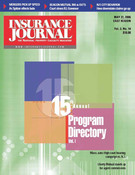The words in support of contingent commissions for independent agents are getting stronger and being turned into action.
Gary R. Gregg, president and chief executive officer, Liberty Mutual Agency Markets, recently expressed the frustration many in the independent agency system share with the portrayal of contingent commissions.
“Even a straight policy is contingent. Getting paid is contingent on selling a policy–it’s all contingent,” he told agents in late April at the Big “I” National Legislative Conference and Convention in Washington, D.C.
At the same Big “I” conference, another CEO sounded a similarly supportive note for contingencies.
“I believe strongly in the contingency process,” said Michael Browne, president and chief executive officer, Harleysville Insurance. “If independent agents continue to stay organized, articulate and keep pushing back, I think they can go a long way to continuing the system.”
Barely a week later, Liberty Mutual turned the rhetoric into action. Unlike American International Group, Zurich, ACE and other insurers before it that have settled similar charges, Liberty Mutual Insurance Group announced it would fight allegations of anti-competitive practices that have been brought against it by the attorneys general of New York and Connecticut.
The Boston-based insurer is insisting that charges regarding improper commissions and bid-rigging are untrue and overblown and says it is willing to go to court to defend itself and its practices rather than settle with the two states.
Negotiations fail
After two years of negotiations, Liberty Mutual said it has been unable to reach a resolution and believes the states’ settlement demands have been excessive.
“We have tried to reach resolution and can only describe their settlement demands as excessive and unreasonable: both in terms of magnitude and in their demands that we change legitimate business practices in states outside their legal jurisdictions,” the company said in a statement.
“We have declined these demands and are preparing to resolve the issues in court,” the statement added.
The insurer took its stand following the filing of complaints by the offices of New York Attorney General Eliot Spitzer and Connecticut Attorney General Richard Blumenthal involving bid-rigging and commission payments.
Bid-rigging allegations
The complaints describe alleged cooperation of Liberty Mutual employees in a bid-rigging scheme in which the employees provided large insurance broker Marsh with so-called “B” quotes for excess casualty accounts. The quotes were intentionally less favorable than other insurers’ quotes.
In August 2005, a former Liberty Mutual executive, Kevin Bott, pled guilty to criminal charges in connection with big-rigging conduct while employed at Liberty Mutual.
The complaints also find fault with Liberty Mutual for paying contingent commissions–or what the attorneys general call “kickbacks” and “payoffs” — to insurance brokers and independent agents to encourage them to place more business with Liberty Mutual.
“Brokers and agents responded to these incentives, steering their clients to Liberty Mutual and in many cases violating their fiduciary duty to assist their clients in finding the best insurance for the lowest price,” according to Spitzer.
According to Blumenthal, since at least the mid-1990s, Liberty Mutual has paid tens of millions of dollars in so-called contingent commissions to insurance brokers like Marsh, Aon Corporation, Willis Group Holding Ltd., and Arthur J. Gallagher & Co.
Blumenthal said Liberty Mutual’s “anti-competitive conspiracies” violate the Connecticut Unfair Trade Practices Act, as well as the Connecticut Antitrust Act.
In its defense
Liberty Mutual is prepared to defend its contingent commission practices.
“Allegations of wrongdoing regarding commission payments and reinsurance brokering are incorrect. Liberty Mutual’s conduct in both areas was appropriate and lawful,” the company stated.
As for the bid-rigging charges, Liberty Mutual has not denied that former employees engaged in bid-rigging but insists it is not a common company practice as alleged.
“Unfortunately, two former lower level employees seriously violated our trust and our standards of conduct in their quotation activity,” the insurer said.
In pressing similar cases against Zurich, ACE, AIG and other insurers, Spitzer, Blumenthal and several other states obtained settlements worth billions of dollars. A number of those settlements have also required the insurers to alter their commission payment practices, with effects felt in other states.
Was this article valuable?
Here are more articles you may enjoy.


 Uber Jury Awards $8.5 Million Damages in Sexual Assault Case
Uber Jury Awards $8.5 Million Damages in Sexual Assault Case  Nine-Month 2025 Results Show P/C Underwriting Gain Skyrocketed
Nine-Month 2025 Results Show P/C Underwriting Gain Skyrocketed  Inside the Toxic Legacy of Georgia-Based Mulitbillion-Dollar Carpet Empire
Inside the Toxic Legacy of Georgia-Based Mulitbillion-Dollar Carpet Empire  What Analysts Are Saying About the 2026 P/C Insurance Market
What Analysts Are Saying About the 2026 P/C Insurance Market 


